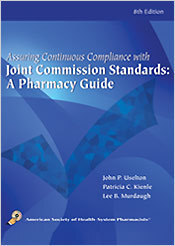ASHP has new edition on accreditation compliance for hospital pharmacies
by
Astrid Fiano, DOTmed News Writer | July 15, 2010

Assuring Continuous
Compliance with Joint
Commission Standards,
8th Edition
The American Society of Health-System Pharmacists (ASHP) of Bethesda, MD, has recently released the eighth edition of Assuring Continuous Compliance with Joint Commission Standards: A Pharmacy Guide. The guide's co-authors are Cardinal Health's Pharmacy Solutions experts John P. Uselton, R.Ph, Patricia Kienle, R.Ph., MBA, FASHP, and Lee Murdaugh, R.Ph, Ph.D, who lead the Quality and Regulatory Affairs team within Cardinal Health. Cardinal Health is based in Dublin, OH.
DOTmed spoke with Uselton about how the guide is a resource to hospital pharmacies in preparing for surveys by such accrediting organizations as the Joint Commission, the American Osteopathic Association, and Det Norske Veritas Healthcare, as well as the Centers for Medicare and Medicaid Services.
There are Cardinal Health personnel in many hospital pharmacies that have outsourced pharmacy operations. Cardinal Health employees serve as directors of pharmacies and manage over two hundred hospital pharmacies around the country. Cardinal Health also helps hospitals prepare for accreditation audits and surveys. Much of the knowledge in the new edition comes from the experiences of Cardinal Health in pharmacy best practices.
A resource on compliance for hospital pharmacies must feature in-depth information on important safety issues. "What we try to do is a make a usable reference--and focus on the actual areas where we see pharmacies receiving their recommendations for improvement, and any major deficiencies cited by the Joint Commission," Uselton explained. "But we also go a step beyond that. We have access to all types of surveys, including the Joint Commission and other accrediting organizations, as well as Medicare surveys, and state department of health surveys. Pharmacies are always being inspected by some organizational body." Through the information obtained from the surveys, Uselton and the other experts are able to determine the high-priority issues.
The findings in the surveys have been consistent. For example, the most frequently cited deficiencies are lack of security and lack of proper storage for medication. "You have to understand that in a hospital or other institution, medications are everywhere. Most of the patients admitted are going to get at least one medication. At the facility, part of the problem is just the enormity of the situation. Facilities need to take steps on supervising the medications, making sure the medications are stored correctly, and be sure the medications are secure," Uselton said. "So from a book standpoint, what we do is go through many surveys every year, and we glean from those surveys why hospitals are cited as being deficient. We build upon that information." The reference guide contains checklists related to the different parts of the surveys. Mediation safety is the major topic, and others include specific chapters on adverse drug reactions, security and infection control.
